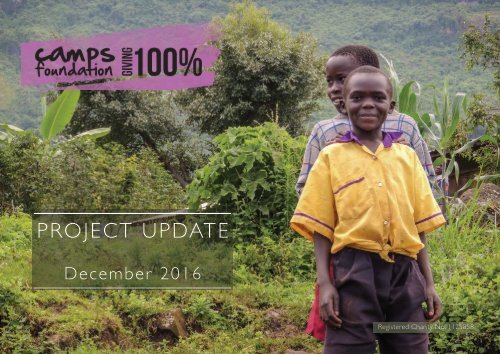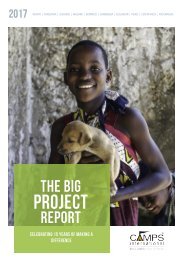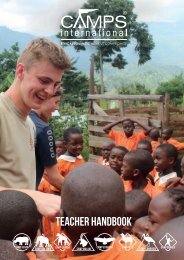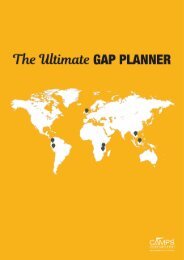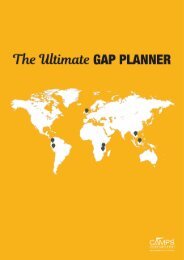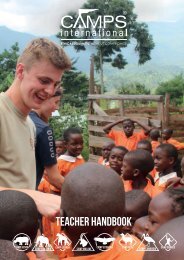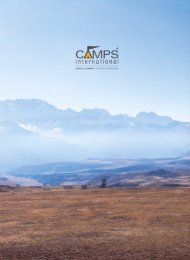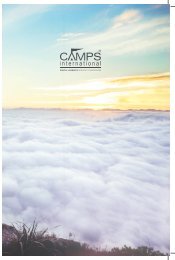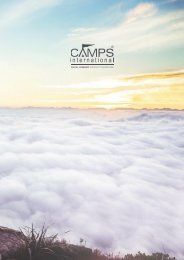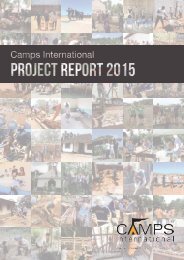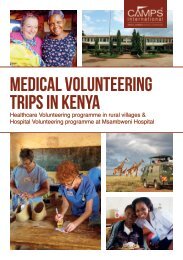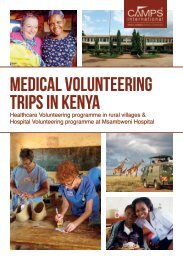Camps Foundation: Project Update
A project update from the Camps Foundation for November 2016
A project update from the Camps Foundation for November 2016
Create successful ePaper yourself
Turn your PDF publications into a flip-book with our unique Google optimized e-Paper software.
PROJECT UPDATE<br />
December 2016<br />
Registered Charity No: 1125858
Summer is always the busiest time for us and a great time to make significant progress with our projects. This summer was<br />
our biggest ever with more than 1,700 independent volunteers and teams from schools, colleges, universities travelling out<br />
to eight of our destinations and working hard on nearly 100 different project activities.<br />
So now is the perfect time to give you an update on the progress of just some of the projects that our amazing volunteers<br />
have worked on.<br />
I hope you’ll enjoy reading each progress report and remember, this doesn’t include all our projects worldwide. We’re<br />
hoping to publish the full report at the beginning of next year so keep an eye out for it. As you’ll see, our volunteers and<br />
donors have made a massive difference to thousands of people’s lives so far and helped us safeguard some of the world’s<br />
most endangered and important wild spaces.<br />
With your continued support we can keep making a difference to these wonderful communities, creating a brighter future<br />
for all.<br />
Happy Holidays!
Featured <strong>Project</strong>s<br />
Medical Centre,<br />
Esmeraldas<br />
‘26 de Septiembre’ School,<br />
Esmeraldas<br />
Tourist eco-cabins,<br />
Amazonia<br />
Children’s Day Care Centre,<br />
Costa<br />
Rainwater harvesting &<br />
reforestation,<br />
Kuri Kucho<br />
Agroecology in the community,<br />
Kuri Kucho<br />
Healthy Homes,<br />
Titicaca<br />
Cultural house,<br />
Colca<br />
Toilets & sanitation,<br />
Moray<br />
Sironko classroom refurbishment,<br />
Jinja<br />
Healthcare Outreach Programme,<br />
Marungu<br />
School administration block,<br />
Itinyi<br />
School improvement & Feeding programme,<br />
Sasenyi<br />
Sports Development,<br />
Sasenyi<br />
Wildlife conservation & Marungu tree nursery,<br />
Rukinga<br />
Community Support,<br />
Muhaka<br />
Classroom construction,<br />
Beng Mealea<br />
English teacher,<br />
Beng Mealea<br />
Village housing,<br />
Beng Pae<br />
English teacher,<br />
Beng Pae<br />
Kindergarten,<br />
Bongkud<br />
Community Centre,<br />
Tinangol<br />
Community Centre,<br />
Timbang Batu<br />
Gravity Water Feed,<br />
Utan Paradise<br />
Fumvhu School refurbishment & Traditional house,<br />
Kidia<br />
Mbokomu & Father Neville School classroom construction,<br />
Mbokomu<br />
Subutuni Primary classroom construction,<br />
Tanga<br />
Subutuni Village Housing <strong>Project</strong>,<br />
Tanga
Chura, Esmeraldas<br />
Medical Centre<br />
In January 2016 the river Esmeraldas burst its<br />
banks, destroying many homes in Chura and<br />
badly damaging the foundations of the only<br />
medical centre in the area. The building has<br />
since been condemned so the community are<br />
without access to medical facilities.<br />
A benefactor has come forward and offered<br />
200m of his land for a new centre that will benefit<br />
more than 5,000 people.<br />
So far we’ve constructed the perimeter wall for<br />
the centre. The government are also supporting<br />
the project, providing labour and building<br />
materials.<br />
‘26 de Septiembre’ School Refurbishment<br />
Since the founding of the school in 1984, the parents of pupils have been working hard to maintain<br />
and update the space as the government has offered little support. Parents and teachers used to<br />
organise fundraising events to cover the ongoing maintenance costs. However, since a law passed<br />
prohibiting such activities, the parents were no longer able to help the school.<br />
That’s why we’ve stepped in to support this community. We are working in conjunction with the local<br />
council who are providing some materials and labour, gradually improving amenities.<br />
So far we’ve refurbished the dining room and kitchen. Three of the toilets have been restored. All the<br />
desks at the school have been refurbished and we’ve replaced the roof on one of the classrooms.<br />
The next phase is to build a new classroom, install new doors and windows in the dining room, make<br />
furniture for the kitchen, replace the remaining sections of roof, refurbish the remaining toilets and<br />
build a dividing wall in one of the classrooms so that it can be used by more children at one time. We’ll<br />
also construct teacher accommodation and create a playground.
Puerto Rico, Costa<br />
Children’s Day Care Centre<br />
The completion of this children’s centre will contribute to improved development in the children. Their nutrition will improve due to a new kitchen which will<br />
be used to prepare fresh healthy meals.<br />
The concrete foundations and supporting pillars have now been completed. The latest group of volunteers are starting to build the walls for the office,<br />
kitchen and toilets. A septic tank has also been dug out with supporting walls built and covered.<br />
Our next activities are to finish the office, kitchen and toilets, install thatched roofing, lay wooden floors and build an access ramp. We’ll also work on<br />
connecting water and sewage, making furniture, creating a playground and establishing an organic garden and a greenhouse.<br />
The parents within the community are very excited by the prospect of having somewhere safe for their children to play and be cared for whilst they go out<br />
to work. They’ve been very supportive by helping with the construction and bringing refreshments to our hard working volunteers.
San Pablo Urco, Kuri Kucho<br />
Rainwater Harvesting<br />
This community has been suffering from drought for more than a year now. As a pilot project we built<br />
a water tank for rain water harvesting using recycled bottles in the school. We want the community<br />
to see how the tank works and to educate them on water management, conservation and harvesting.<br />
The first rainwater harvesting tank was made from recycled bottles and concrete and has generated<br />
a lot of interest within the community.<br />
We’ve now started the construction of a water tank in the home of one of the community members.<br />
This should be completed in the next month or so in time for the next rainy season. Next year we will<br />
start on the construction of more water tanks for each house that needs one.<br />
Agroecology in the Community<br />
Most people in the community are subsistence<br />
farmers. The community has asked us to provide<br />
training in agroecology techniques to help them<br />
improve their yield.<br />
So far we have installed three fuel efficient,<br />
smokeless, wood fired stoves. We’ve built 14<br />
guinea pig hutches and produced 300kg of<br />
organic fertiliser.<br />
The next phase will be to build six more stoves<br />
and continue train as many people as possible<br />
on agroecology practices.
Hilata, Titicaca<br />
Healthy Homes for poor families<br />
The Hilata community is located on the Altiplano on the shores of Lake Titicaca, where living conditions are harsh. The extreme altitude and climate here<br />
make it very difficult to grow crops, inevitably leading to high levels of malnutrition.<br />
For generations, people have cooked on wood fire stoves. However, devastating deforestation has led to a lack of fuel available for cooking. These<br />
traditional stoves also lead to chronic health problems that cause major respiratory and optical disease as they produce vast quantities of toxic smoke inside<br />
houses with very little ventilation.<br />
This healthy homes initiative is an integrated project that addresses many of these challenges by removing smoke from within the home, providing the<br />
means to produce fresh fruit and vegetables and creating a safe place to rear livestock.<br />
So far we’ve built 15 smokeless fuel efficient stoves, 5 greenhouses and 5 cattle sheds. We’ve completed the walls of 10 more greenhouses and livestock<br />
sheds and are about to install the roof on each.
Colca & Moray, Peru<br />
Cultural House, Colca<br />
The community of Pinchollo is located in the Canon de Colca valley in the Arequipa Region. Due to its<br />
location, the community has been unable to take advantage of the many tourists passing through on<br />
the way to the world famous canyon, the third largest tourist attraction in Peru.<br />
By building a cultural house as a tourist attraction, we’re aiming to make this area more attractive to<br />
visitors thereby providing a sustainable income for those who live here.<br />
The local government are supporting this project by including the cultural house on every ticket issued<br />
to visitors arriving at the canyon.<br />
So far the cultural house is progressing well and we’ve completed the building of the first floor. This<br />
includes the foundations, supporting columns, stone walls and the floor. We’ll now continue work on<br />
the second storey.<br />
Toilets & Sanitation, Moray<br />
Kajllarakay is in a remote area that has been<br />
largely forgotten in terms of development. We<br />
are working closely with the local municipality<br />
to fulfil basic sanitation requirements in the<br />
community; flushing toilets, sinks and shower<br />
facilities.<br />
Last year we built 25 toilets and this year we<br />
finished a further 5 with 15 more well on the way.<br />
This means that now around 150 people have<br />
access to these much needed facilities.
Healthcare Outreach, Tsavo<br />
Free medical care<br />
In 2011, <strong>Camps</strong> International set up a network<br />
of free medical clinics, providing much needed<br />
support to the poorest rural communities in<br />
Kenya that don’t have access to medical care.<br />
Every year, a group of remarkable healthcare<br />
professionals from the UK travel out to work in<br />
collaboration with local medical practitioners<br />
and doctors, offering free consultations,<br />
vaccinations, advice and treatment to as many<br />
people as possible.<br />
So far, our clinics have helped more than 6,000<br />
people.<br />
Healthcare workshops<br />
In September, 58 UK nurses and non-medical<br />
volunteers travelled to Marungu and the<br />
surrounding area to help us set up and provide<br />
free medical clinics for the community.<br />
As well as providing access to a medical<br />
professional and free treatment, our volunteers<br />
also ran education workshops on sexual health<br />
and hygiene for girls.<br />
Saving lives<br />
More than 800 people received a consultation<br />
with a qualified doctor or nurse and received<br />
treatment where necessary.
Sasenyi, Tsavo<br />
School Improvement<br />
We’ve completed the building of a new classroom<br />
block that’s big enough to accommodate up to<br />
90 students at any one time.<br />
Our volunteers have also constructed 40 desks<br />
- enough to seat 80 children - and handed these<br />
over to the school.<br />
The school, parents and pupils have been really<br />
supportive throughout this project, providing us<br />
with raw materials such as sand and hardcore.<br />
We’ll continue to supply additional classrooms<br />
and repair existing buildings to meet the<br />
increasing demands of student enrolment.<br />
Feeding Programme<br />
We’ve renovated the school kitchen, refurbished 3<br />
energy efficient stoves that were built in 2012 and<br />
constructed a further 3 larger stoves.<br />
Energy efficient stoves are a much cleaner, safer<br />
and healthier method of cooking compared to the<br />
traditional three-stone method, and because they<br />
use significantly less firewood, they’re much better<br />
for the environment too.<br />
Our donors raised enough funds to provide an<br />
essential meal for 720 students during school time<br />
for two terms. For many children, this will be their<br />
only meal of the day. That’s why long term funding<br />
is critical for the continuation of this programme.<br />
Sports Development<br />
In September, volunteers with a keen interest<br />
in sport travelled out to Sasenyi and erected<br />
football, netball and volleyball posts at the<br />
school.<br />
They then coached more than 150 students in<br />
various disciplines and donated games kits to<br />
the children.
Rukinga, Tsavo<br />
Providing water for wildlife<br />
The situation for elephants has never been more<br />
devastating. With more than 40,000 animals<br />
killed each year, it’s estimated that in under a<br />
decade, we may lose them altogether.<br />
That’s why it’s so critical that we support them<br />
by making the environment as favourable as<br />
possible for wildlife.<br />
Since April, our volunteers have expanded<br />
and deepened two existing waterholes and<br />
associated drainage in Rukinga wildlife sanctuary<br />
to support wildlife through extended periods of<br />
drought and discourage them from straying into<br />
neighbouring villages.<br />
Elephant deterrent fences<br />
Another approach to reducing conflict between<br />
elephants and humans is to help protect those<br />
neighbouring farmers whose crops are at risk.<br />
So far we’ve placed 250m of elephant deterrent<br />
fencing along a stretch of farmland neighbouring<br />
the sanctuary.<br />
The fence is made from rope that’s impregnated<br />
with recycled engine oil and chilli peppers -<br />
something that’s unbearable for an animal with<br />
such a sensitive sense of smell.<br />
The success of this project is dependent on<br />
long term funding as the fence needs regular<br />
maintenance.<br />
Reforestation<br />
We’ve also planted around 2,500 indigenous<br />
trees in the sanctuary, helping to offset carbon<br />
emissions and tackle climate change.
Kidia, Kilimanjaro<br />
Fumvhu School Refurbishment<br />
We’re continuing to tackle the severe soil erosion problem on the school site by stabilising the ground<br />
with more sand and clay bags. This summer we filled and laid another 400 bags, bringing the total to<br />
over 1200.<br />
Our next job is to refurbish the classroom floor and reinforce supporting walls by constructing a<br />
veranda around the classroom block.<br />
Traditional House<br />
We’ve also nearly finished the construction of a<br />
traditional house for a 65 year old lady whose<br />
house was on the verge of collapse and asked<br />
us for help.<br />
Once we’ve completed the floor, plastered and<br />
painted the interior, the house will be handed<br />
over to her.
Mbokomu, Moshi<br />
Mbokomu School<br />
We have been supporting Mbokomu Primary School since 2008. The school was built in the 1950’s<br />
and due to lack of funding, it has not received the adequate upgrades and repairs in the subsequent<br />
years. As with Father Neville School and Fumvhu Primary, the area is suffering from severe soil erosion,<br />
putting the infrastructure of the school at risk.<br />
We’ve started working on a veranda to strengthen classroom foundations as well as rebuilding broken<br />
and hazardous flooring inside seven classrooms. So far we’ve replaced the old floor and built a<br />
supporting veranda in four of the classrooms.<br />
Work continues on the remaining three.<br />
Father Neville Classroom Build<br />
We’re making great progress on the second<br />
classroom at Father Neville’s School.<br />
The walls, lintels, gable and wall plastering are<br />
now completed.<br />
We’re now working on completing the roof,<br />
installing windows and doors, plastering and<br />
painting, and furnishing the classroom with<br />
desks and a blackboard.
Subutini, Tanga<br />
Improving education facilities<br />
Construction of the Subutini classroom that will<br />
be used as a pre-school is continuing.<br />
<strong>Foundation</strong>s and hardcore have been laid and<br />
we’ve started building the walls.<br />
Work on the veranda has also begun.<br />
Traditional house building<br />
The elderly lady’s house is nearly complete. We’ve built the supporting structures (poles, weaving<br />
and strengthening) and finished the first layer of mud filling. The roof structure and thatching is also<br />
finished.<br />
All that’s left to do is wall smoothing, the interior floor, white washing and painting.<br />
The local community have been very supportive, providing us with locally sourced building materials.<br />
This has enabled us to keep costs low and therefore be able to build more housing for the needy.<br />
More than 10 families in the village are currently in immediate need of housing.
* Sironko, Jinja<br />
Sironko Classroom Improvement<br />
The district of Sironko lies in eastern Uganda, near the border with Kenya and close to Mount Elgon. This is one of the poorest areas in Uganda and is<br />
seasonally affected by severe weather.<br />
The infrastructure at this primary school is in a severe state of disrepair and the majority of the pupils are taught outside in all weathers due to a lack of<br />
facilities.<br />
For the past year we’ve been supporting the school by beginning the construction of a new classroom. Our generous donors have raised enough money<br />
to complete the flooring and plastering of this much-needed building and painting the inside and out.<br />
Over the coming months the doors and windows will be installed.
Sabah, Borneo<br />
Kindergarten, Bongkud<br />
Work on the new kindergarten at Bongkud is progressing well. We’ve erected a boundary fence to<br />
secure the site and installed the roof on the new building.<br />
Work is continuing on the surrounding storm drain and culvert, which is now covered with concrete<br />
slabs. Gabions are filled and are in place to protect the slope adjacent to the entrance and concrete<br />
is now covering the soil.<br />
A reinforced concrete driveway has been completed, allowing access to the site in all weathers.<br />
We’re now continuing work on resurfacing the floor ready for the installation of door and window<br />
frames.<br />
We’re also about to install two large gravity fed water systems at the kindergarten, providing a ready<br />
supply of fresh water for the children.<br />
Water <strong>Project</strong>, Utan Paradise<br />
Kampung Banjaran Kimanis doesn’t have any<br />
access to the government water supply and<br />
currently relies on an old, small diameter feed<br />
from a source close to the village. Supply is<br />
sporadic and unreliable due to frequent pipe<br />
breakages and poor water pressure.<br />
We’ve started work on building a dam with<br />
associated larger and stronger piping further up<br />
the hill to improve water flow. The 5 x 2 foot<br />
concrete dam is now finished and we’ve cleared<br />
the route and installed 500m of piping.<br />
However, due to the hazardous terrain, the<br />
remaining work will be completed by experienced<br />
locals instead of our volunteers.
Cambodia<br />
New Classroom, Beng Mealea<br />
We’ve made good progress with the new<br />
classroom build at Beng Mealea. Not only have<br />
we completed the construction of concrete<br />
support posts and brick walls, most of the walls<br />
have now been plastered and the roof is in place.<br />
The next steps are to finish plastering the walls,<br />
lay floor tiles, install windows and doors, and<br />
furnish the interior by building desks for all the<br />
children and create visual aids.<br />
Village Housing, Beng Pae<br />
We’ve now completed four houses and handed them over to the families of Ta Lek. The first three<br />
houses were constructed using traditional methods and materials: timber frames, corrugated iron<br />
roofing and simple window hatches (as pictured above).<br />
The fourth house was built using bricks and concrete to make it more resilient to seasonal flooding<br />
(see above).<br />
There are so many houses that need replacing in this area that this will be an ongoing project for many<br />
years to come and is dependent on long term funding.
Status of Other <strong>Project</strong>s<br />
Itinyi School Admin Block, Kenya<br />
Work is progressing on the new admin block. We’ve<br />
now completed the floor foundation and made<br />
more than 300 bricks that will be used to build up<br />
the walls in preparation for the roof installation.<br />
Muhaka Community, Kenya<br />
Our annual report will include details of our ongoing<br />
community development projects in Muhaka.<br />
Child Sponsorship, Africa<br />
Many of our donors are continuing to support a<br />
child, enabling them to attend school.<br />
Tinangol Community Centre, Borneo<br />
There’s a delay in starting this project because of<br />
ongoing discussions with the community as to<br />
where the new building should be situated. Work<br />
expected to start in 2017.<br />
Timbang Batu Community Centre,<br />
Borneo<br />
We’ve demolished the old abandoned community<br />
centre. However, as with Tinangol, there has been<br />
a delay in building as the community has requested<br />
that the new centre is built on a different site so<br />
that it won’t be as susceptible to water damage.<br />
They’ve also requested a public toilet to be added<br />
to the centre. Plans are ongoing and building work<br />
is expected to begin in 2017.<br />
English Teachers, Cambodia<br />
Due to logistical issues of school holidays and<br />
exams, there has been minimal spend on recruiting<br />
an English teacher at Beng Pae and Beng Mealea.<br />
Instead, children have been informally taught at our<br />
camp by volunteers where possible.<br />
Eco cabins, Ecuadorian Amazon<br />
The Amazon is currently facing an unprecedented<br />
threat from mining. People in the community are<br />
being persuaded to sell their land to large mining<br />
companies. The communities of San Alberto and<br />
Rio Blanco want to preserve their lands for future<br />
generations. That’s why we’re working together<br />
with them to construct eco-tourism cabins in order<br />
to boost community tourism and local income. So<br />
far we’ve built a cabin and finished the sleeping area<br />
and toilets. Our next job is to varnish the structure,<br />
install water for the toilets and build a kitchen for<br />
the eco-bungalow.
For more information on the work of The <strong>Camps</strong> <strong>Foundation</strong> or to donate, please contact<br />
projects@campsfoundation.org or visit www.justgiving.com/campsinternational


